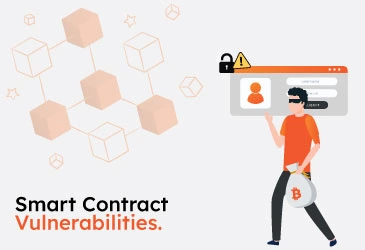How Does Blockchain Technology Help Organizations When Sharing Data?
Updated : June 07, 2023

Blockchain technology has emerged as a transformative solution for organizations seeking secure and efficient data sharing. By leveraging its decentralized and immutable nature, blockchain offers several benefits that address common challenges associated with traditional data-sharing methods. In addition to this, we also suggest performing smart contract audits to secure your data.
This article explains how blockchain technology empowers organizations in sharing data securely and transparently.
How Does Blockchain Technology Help Organizations When Sharing Data?
Blockchain technology offers several advantages to organizations when it comes to sharing data. It ensures enhanced security and privacy through its decentralized and immutable nature. Data stored on a blockchain is highly resistant to tampering and unauthorized access, providing organizations with a robust framework to protect sensitive information
Blockchain facilitates transparent and verifiable data sharing, enabling organizations to establish trust among participants. By creating a shared ledger that is visible to all authorized parties, blockchain eliminates the need for intermediaries and reduces the risk of data manipulation or fraud.
Additionally, blockchain technology enables efficient data exchange through smart contracts, automating and streamlining the sharing process. These self-executing contracts ensure that data is shared according to predefined rules and conditions, reducing manual intervention and potential errors.
Overall, blockchain technology empowers organizations to securely share data while maintaining trust, integrity, and control over their information assets. Additionally, you also use some safe alternatives to blockchain for data management.
Benefits Of Using Blockchain Technology For Data Sharing
Given below is the list of benefits blockchain technology offers for data management:
-
Enhanced Security and Data Integrity
Blockchain provides enhanced security and data integrity through its decentralized architecture and cryptographic techniques. Each transaction or data entry is stored in a block, linked to the previous one using cryptographic hashes, creating an unalterable chain. This tamper-proof nature ensures that data shared on the blockchain remains secure from unauthorized modifications and hacking attempts.
-
Improved Transparency and Trust
Blockchain promotes transparency and trust among participants by offering a shared, immutable ledger. Organizations can leverage blockchain's transparency to ensure that all stakeholders have access to the same information, eliminating information silos and reducing the need for intermediaries. This transparency fosters trust, as participants can independently verify the accuracy and integrity of shared data.
-
Streamlined Data Sharing Processes
Traditional data sharing often involves complex and time-consuming processes, including data reconciliation, intermediaries, and manual verifications. With blockchain, organizations can streamline these processes by establishing smart contracts. Smart contracts are self-executing agreements that automatically enforce predefined rules and conditions, reducing administrative overhead and enabling real-time data sharing.
-
Enhanced Data Privacy and Control
Blockchain allows organizations to maintain control over their data while still sharing it with trusted parties. Through the use of cryptographic keys and permissioned and permissionless blockchain, organizations can determine who can access and view specific data on the blockchain. This granular control over data access ensures privacy and enables organizations to comply with regulatory requirements, such as data protection regulations like GDPR.
-
Increased Efficiency and Cost Savings
By eliminating the need for intermediaries, manual reconciliations, and redundant processes, blockchain technology enables organizations to achieve increased operational efficiency and cost savings. Data sharing on a shared blockchain network reduces delays, paperwork, and the risk of errors, ultimately leading to faster and more accurate decision-making processes.
-
Enhanced Data Auditing and Compliance
Blockchain's transparent and immutable nature simplifies data auditing and compliance efforts. Organizations can trace the origin and lifecycle of data shared on the blockchain, making it easier to demonstrate compliance with regulatory requirements. Auditors can independently verify the integrity of data, reducing the need for extensive manual audits and improving the overall auditing process.
-
Potential for New Business Models and Innovation
Blockchain technology opens up new possibilities for innovative business models and industry collaborations. Organizations can explore tokenization, where assets are represented as digital tokens on the blockchain, enabling new forms of value exchange and monetization. One of the popular examples is web3 gaming. Additionally, blockchain's decentralized nature facilitates secure peer-to-peer transactions, empowering organizations to create decentralized applications (dApps) and explore novel avenues for value creation.
Which Industries Can Benefit From Blockchain Data-Sharing?
Blockchain data-sharing has the potential to bring transformative benefits to various industries, revolutionizing how data is managed, shared, and secured. Here's a list of the industries that can benefit from blockchain data-sharing:
-
Supply Chain and Logistics
Blockchain can enhance supply chain and logistics operations by providing transparency, traceability, and real-time tracking of goods. It enables stakeholders to securely share data related to inventory, shipments, and product provenance, improving efficiency, reducing fraud, and ensuring compliance.
-
Healthcare
The healthcare industry can benefit from blockchain data-sharing to enhance patient data management, interoperability, and privacy. It enables the secure sharing of electronic health records, streamlines clinical trials, and facilitates seamless exchange of patient information across healthcare providers while maintaining data integrity and privacy.
-
Finance and Banking
Blockchain can revolutionize the financial industry by improving transparency, security, and efficiency in data-sharing and transactions. It enables faster and more secure cross-border payments, simplifies remittances, reduces fraud, and facilitates decentralized financial services like smart contracts and decentralized lending.
-
Intellectual Property
Industries that rely on intellectual property, such as entertainment, publishing, and art, can benefit from blockchain data-sharing to establish proof of ownership, and timestamp creations, and protect intellectual assets. Blockchain provides an immutable record of ownership and can streamline the licensing and distribution of intellectual property.
-
Energy and Utilities
Blockchain data-sharing can optimize energy distribution, enable peer-to-peer energy trading, and ensure transparent tracking of renewable energy credits. It allows seamless integration of distributed energy resources, improves grid management, and facilitates efficient energy transactions.
-
Government and Public Sector
Governments can leverage blockchain data-sharing to enhance transparency, streamline public service delivery, and secure data exchange between government entities. It can be used for identity management, voting systems, land registry, supply chain traceability, and public finance management.
-
Retail and E-commerce
Blockchain data-sharing can enhance transparency in the retail industry, allowing consumers to track product origins, certifications, and authenticity. It enables the secure sharing of customer data, streamlines loyalty programs, and facilitates efficient supply chain management and inventory tracking.
-
Insurance
Blockchain data-sharing can transform the insurance industry by improving claims processing, fraud detection, and policy management. It enables secure and tamper-proof storage of policyholder information, automates claim settlements through smart contracts, and enhances transparency in insurance transactions.
-
Real Estate
Blockchain data-sharing can simplify real estate transactions, streamline property ownership transfers, and reduce fraud in the industry. It provides a secure and transparent ledger for recording property titles, contracts, and transactions, facilitating efficient and trusted real estate operations.
-
Education
Blockchain data-sharing can enhance the verification and sharing of educational credentials, certificates, and achievements. It provides a secure and tamper-proof record of educational data, simplifying the verification process for employers, educational institutions, and individuals.
These are a few examples of the industries that can benefit from blockchain data-sharing. As technology continues to evolve, more industries are exploring its potential to transform their data management and sharing practices, driving innovation and efficiency in the digital era.
Conclusion
Blockchain technology revolutionizes data sharing for organizations by providing enhanced security, transparency, efficiency, and control. With its decentralized nature, blockchain offers a trusted and efficient platform for organizations to share data securely and streamline their operations. By getting our blockchain development services, organizations can unlock new opportunities, foster trust among stakeholders, and drive innovation in various industries.
Take control of your smart contract security - Request a professional Smart Contract Audit today and ensure the solidity of your blockchain projects
Insights

What Is A Smart Contract Audit?
Smart contracts are self-executing agreements that run on a blockchain network, allowing for secure and decentralized transactions. Smart contracts ...

Smart Contract Vulnerabilities
Smart contracts have revolutionized how we conduct transactions and execute agreements in the digital age. These self-executing programs ...

Smart Contract Audit Checklist
Smart contracts are self-executing agreements with the terms of the agreement between buyer and seller being directly written into lines of code ...